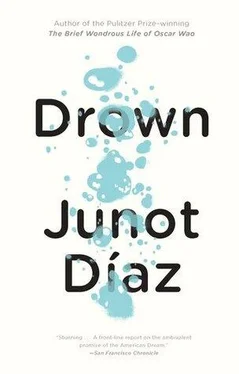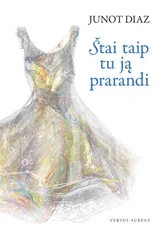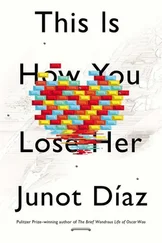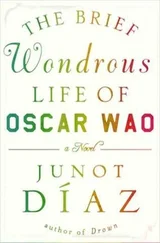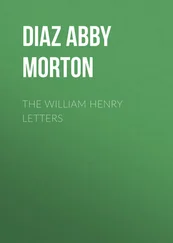He tried to see his familia but each time he set his mind to it, his resolve scattered like leaves before a hurricane wind. Instead he saw his old friends on the force and drank six bottles of Brugal in three days. Finally, on the fourth day of his visit, he borrowed the nicest clothes he could find and folded two hundred dollars into his pocket. He took a guagua down Sumner Welles, as Calle XXI had been renamed, and cruised into the heart of his old barrio. Colmados on every block and billboards plastering every exposed wall or board. The children chased each other with hunks of cinder block from nearby buildings — a few threw rocks at the guagua, the loud pings jerking the passengers upright. The progress of the guagua was frustratingly slow, each stop seemed spaced four feet from the last. Finally, he disembarked, walking two blocks to the corner of XXI and Tunti. The air must have seemed thin then, and the sun like a fire in his hair, sending trickles of sweat down his face. He must have seen people he knew. Jayson sitting glumly at his colmado, a soldier turned grocer. Chicho, gnawing at a chicken bone, at his feet a row of newly shined shoes. Maybe Papi stopped there and couldn’t go on, maybe he went as far as the house, which hadn’t been painted since his departure. Maybe he even stopped at our house and stood there, waiting for his children out front to recognize him.
In the end, he never visited us. If Mami heard from her friends that he was in the city, with his other wife, she never told us about it. His absence was a seamless thing to me. And if a strange man approached me during my play and stared down at me and my brother, perhaps asking our names, I don’t remember it now.
Papi returned home and had trouble resuming his routine. He took a couple of sick days, the first three ever, and spent the time in front of the television and at the bar. Twice he turned down negocios from Jo-Jo. The first ended in utter failure, cost Jo-Jo “the gold in his teeth,” but the other, the FOB clothing store on Smith Street, with the bargain basement buys, the enormous bins of factory seconds and a huge layaway shelf, pulled in the money in bags. Papi had recommended the location to Jo-Jo, having heard about the vacancy from Chuito, who was still living in Perth Amboy. London Terrace Apartments had not yet opened.
After work Papi and Chuito caroused in the bars on Smith and Elm Streets and every few nights Papi stayed over in Perth Amboy. Nilda had continued to put on weight after the birth of the third Ramón and while Papi favored heavy women, he didn’t favor obesity and wasn’t inclined to go home. Who needs a woman like you? he told her. The couple began to fight on a regular schedule. Locks were changed, doors were broken, slaps were exchanged but weekends and an occasional weekday night were still spent together.
In the dead of summer, when the potato-scented fumes from the diesel forklifts were choking the warehouses, Papi was helping another man shove a crate into position when he felt a twinge about midway up his spine. Hey asshole, keep pushing, the other man grunted. Pulling his work shirt out of his Dickies, Papi twisted to the right, then to the left and that was it, something snapped. He fell to his knees. The pain was so intense, shooting through him like fireballs from Roman candles, that he vomited on the concrete floor of the warehouse. His co-workers moved him to the lunchroom. For two hours he tried repeatedly to walk and failed. Chuito came down from his division, concerned for his friend but also worried that this un-scheduled break would piss off his boss. How are you? he asked.
Not so good. You have to get me out of here.
You know I can’t leave.
Then call me a cab. Just get me home. Like anyone wounded, he thought home could save him.
Chuito called him the taxi; none of the other employees took time to help him walk out.
Nilda put him in bed and had a cousin manage the restaurant. Jesú, he moaned to her. I should’ve slowed down a little. Just a little bit longer and I would’ve been home with you. Do you know that? A couple of hours more.
She went down to the botánica for a poultice and then down to the bodega for aspirin. Let’s see how well the old magic works, she said, smearing the poultice onto his back.
For two days he couldn’t move, not even his head. He ate very little, strictly soups she concocted. More than once he fell asleep and woke up to find Nilda out, shopping for medicinal teas, and Milagros over him, a grave owl in her large glasses. Mi hija, he said. I feel like I’m dying.
You won’t die, she said.
And what if I do?
Then Mama will be alone.
He closed his eyes and prayed that she would be gone and when he opened them, she was and Nilda was coming in through the door with another remedy, steaming on a battered tray.
He was able to sit up and call in sick by himself on the fourth day. He told the morning-shift manager that he couldn’t move too well. I think I stay in bed, he said. The manager told him to come in so he could receive a medical furlough. Papi had Milagros find the name of a lawyer in the phone book. He was thinking lawsuit. He had dreams, fantastic dreams of gold rings and a spacious house with caged tropical birds in its rooms, a house awash with sea winds. The woman lawyer he contacted only worked divorces but she gave him the name of her brother.
Nilda wasn’t optimistic about his plan. Do you think the gringo will part with his money like that? The reason they’re so pale is because they’re terrified of not having any plata. Have you even spoken to the man you were helping? He’s probably going to be a witness for the company so that he won’t lose his job the same way you’re going to lose yours. That maricón will probably get a raise for it, too.
I’m not an illegal, he said. I’m protected.
I think it’s better if you let it drop.
He called Chuito to sound him out. Chuito wasn’t optimistic either. The boss knows what you’re trying to yank. He no like it, compadre. He say you better get back to work or you’re quitted.
His courage failing, Papi started pricing a consultation with an independent doctor. Very likely, his father’s foot was hopping about in his mind. His father, José Edilio, the loudmouthed ball-breaking vagrant who had never married Papi’s mother but nevertheless had given her nine children, had attempted a similar stunt when he worked in a hotel kitchen in Río Piedras. José had accidentally dropped a tin of stewed tomatoes on his foot. Two small bones broke but instead of seeing a doctor, José kept working, limping around the kitchen. Every day at work, he’d smile at his fellow workers and say, I guess it’s time to take care of that foot. Then he’d smash another can on it, figuring the worse it was, the more money he’d get when he finally showed the bosses. It saddened and shamed Papi to hear of this while he was growing up. The old man was rumored to have wandered the barrio he lived in, trying to find someone who would take a bat to the foot. For the old man that foot was an investment, an heir-loom he cherished and burnished, until half of it had to be amputated because the infection was so bad.
After another week and with no calls from the lawyers, Papi saw the company doctor. His spine felt as if there were broken glass inside of it but he was given only three weeks of medical leave. Ignoring the instructions on the medication, he swallowed ten pills a day for the pain. He got better. When he returned to the job he could work and that was enough. The bosses were unanimous, however, in voting down Papi’s next raise. They demoted him to the rotating shift he’d been on during the first days of the job.
Instead of taking his licks, he blamed it on Nilda. Puta, was what he took to calling her. They fought with renewed vigor; the orange elephant was knocked over and lost a tusk. She kicked him out twice but after probationary weeks at Jo-Jo’s allowed him to return. He saw less of his son, avoiding all of the daily routines that fed and maintained the infant. The third Ramón was a handsome child who roamed the house restlessly, tilted forward and at full speed, as if he were a top that had been sent spinning. Papi was good at playing with the baby, pulling him by his foot across the floor and tickling his sides, but as soon as the third Ramón started to fuss, playtime was over. Nilda, come and tend to this, he’d say.
Читать дальше
